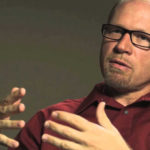We run our website the way we wished the whole internet worked: we provide high quality original content with no ads. We are funded solely by your direct support. Please consider supporting this project.

Will Violence against ISIS Root Out Evil?
Image by arbyreed via Flickr
Fallen humans tend to identify their own group as righteous and any group that opposes them as evil. If they were not evil, we tend to believe, no conflict would exist. Hence, the only way to end the conflict is to rid the world of this evil. This is the age-old “myth of redemptive violence.”
The true cause of violence, of course, is not “the enemy” but something much more fundamental, something both we and the enemy have in common. The true cause lies in the fact that our fallen hearts are idolatrous and subject to the fallen powers that influence us.
So long as people locate their worth, significance, and security in their power, possessions, traditions, reputations, religious behaviors, tribe, and nation rather than in a relationship with their Creator, a violent tit-for-tat game is inevitable. Of course, peaceful solutions must still be sought and can, to some degree, be attained with regard to each particular conflict. But as long as humans define their personal and tribal self-interests over and against other people’s competing personal and tribal interests, violence is inevitable and will break out again.
History is filled with people who believed that this or that war would root out evil once and for all and bring about lasting peace. The myth has been especially strong in American history. We, the righteous nation, will root out all evil. Any peace achieved by violence is a peace forever threatened by violence, thus ensuring that the bloody game will be perpetuated.
The hope of the world lies in a kingdom that is not of this world, a kingdom that doesn’t participate in perpetuation of the bloody game, a kingdom that operates with a completely different understanding of power. The unique nature of this kingdom is revealed in a discussion Jesus had with some of his disciples when they asked who would be the greatest in the kingdom. Jesus responded:
The kings of the Gentiles lord over them; and those in authority over them are called benefactors. But not so with you; rather the greatest among you must become like the youngest, and the leader like one who serves. For who is greater, the one who is at the table or the one who serves? Is it not the one at the table? But I am among you as one who serves. (Lk 23:25-27)
Jesus identified the disciples’ argument as a typical kingdom-of-the-world conflict—and thoroughly pagan. This is the way worldly rulers—and the world in general—naturally think. Indeed, it is a matter of common sense by the world’s standards. Naturally the older is greater than the younger, the leader worthy of higher esteem than the follower, the one who sits at the table greater than the one who serves. Yet Jesus not only rejects this “common sense” logic—he reverses it! Jesus, the Son of God, the one who is greatest by any standard, came to earth not to be served but to serve others, and the kingdom he came to establish would be marked by this distinctive feature.
—Adapted from The Myth of a Christian Nation, pages 26-28
Category: General
Tags: Evil, Myth of a Christian Nation, Non-Violence, Upside-Down Kingdom, Violence, War
Topics: Following Jesus
Related Reading

The Distinctive Mark of Jesus Followers
Jesus’ teaching to love our enemies was understandably shocking to his original audience—just as it is to us today. Jesus expected much, which is why, after telling his audience to love their enemies he added that if we only love those who love us and do good those who do good to us, we’re doing…

If We’re Made For Warfare, Why Non-Violence? And What Will We Fight in Heaven?
In this episode Greg talks about our warrior nature and discusses some interesting implications of that on our understanding of heaven. Links: Website: ReKnew.org http://traffic.libsyn.com/askgregboyd/Episode_0006.mp3

Why Can’t God Stop Evil? The Thomas J. Oord Interview (podcast)
Greg and Thomas talk about Open Theism and how Greg’s views differ from Thomas’s. Theology nerds, get your compass and your flashlight and prepare to go DEEEEEP in the weeds! Thomas’s book: God Can’t Episode 487 http://traffic.libsyn.com/askgregboyd/Episode_0487.mp3

What to Do If You See God as Violent
God really is as beautiful as he is revealed to be on Calvary. Communicating this is my goal in everything I write—especially Crucifixion of the Warrior God and Cross Vision. But for many, to see him as being that loving, is not easy. We have to make a concerted effort for our brains to adjust…

Memorial Day
For Memorial Day, we thought we would repost Greg’s thoughts from 2007. In this post, Greg expresses his conflicted feelings over this holiday and gives a brief defense of Christian pacifism. *** Hope you all had a happy Memorial Day. (Isn’t that something of a misnomer — a happy time remembering people killed in war?) Memorial Day…

Does Romans 13 Condone Government Violence? (podcast)
Greg deconstructs problematic interpretations of Romans 13. Episode 649 http://traffic.libsyn.com/askgregboyd/Episode_0649.mp3
